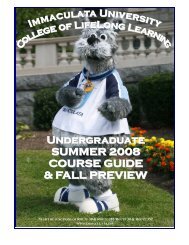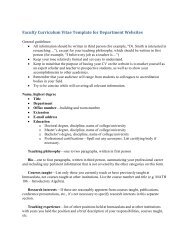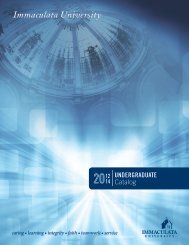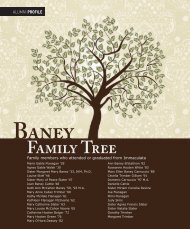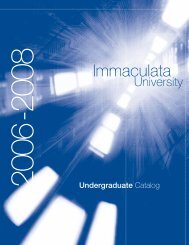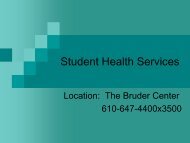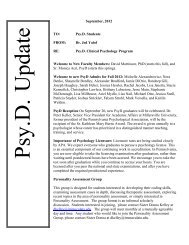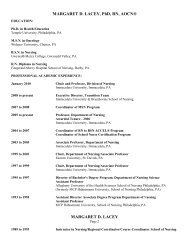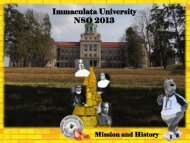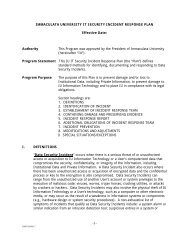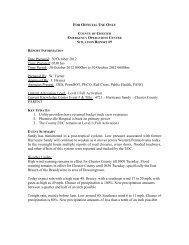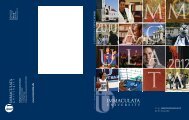Undergraduate Catalog 2008-2010 - Immaculata University
Undergraduate Catalog 2008-2010 - Immaculata University
Undergraduate Catalog 2008-2010 - Immaculata University
Create successful ePaper yourself
Turn your PDF publications into a flip-book with our unique Google optimized e-Paper software.
assignments. Guest speakers will present other topics and students<br />
will attend selected <strong>University</strong> and outside events. Special topics<br />
will be covered each time the course is offered.<br />
ALH 200 Observations in Allied Health and Portfolio<br />
Preparation II (1)<br />
This course is the second in the series of major courses/seminars<br />
for allied health majors. Students in this course are encouraged to<br />
explore selection of their specialization in anticipation of the<br />
collaboration with Lancaster General College of Nursing and Health<br />
Sciences and Thomas Jefferson <strong>University</strong>. Students will be<br />
coached on professional preparation in anticipation of applying for<br />
their clinical assignments. Guest speakers will present other topics<br />
and students will attend selected <strong>University</strong> and outside events.<br />
Special topics will be covered each time the course is offered.<br />
ALH 300 Observations in Allied Health and Portfolio<br />
Preparation III (1)<br />
This course is the third in the series of major courses/seminars for<br />
allied health majors. Students in this course will deepen their<br />
investigation of their chosen specialization and prepare their<br />
application/placement for clinical training with Lancaster General<br />
College of Nursing and Health Sciences or Thomas Jefferson<br />
<strong>University</strong>. Students will be coached on professional preparation in<br />
anticipation of their clinical assignments. Guest speakers will present<br />
other topics and students will attend selected <strong>University</strong> and outside<br />
events, especially in conjunction with their chosen specialization.<br />
HEALTH CARE MANAGEMENT (BA) (Offered only<br />
through ACCEL ® Programs)<br />
REQUIREMENTS FOR DEGREE COMPLETION<br />
• Liberal Arts: English (6); world civilization (3); foreign<br />
language (3)*; philosophy (6)*; theology (6)*; designated<br />
humanities (9)*; social science (9)*; laboratory science (3);<br />
mathematics (3).<br />
*Three credits each of foreign language, philosophy, humanities,<br />
and social science may be met through successful completion of<br />
modules within ACCEL ® .<br />
• Major: HCM 302, 306, 311, 312, 321, 326, 340; ORG 301 ,<br />
303, 304, 307, 312, 320, 390; CCS 341; ENG 242; PHI 384;<br />
THE 381.<br />
• Electives as needed to complete a total of 126 credits.<br />
HCM 302 Contemporary Issues in Health Care (3)<br />
This course introduces the challenges facing the contemporary<br />
health care system and its managers. It focuses on the increasing<br />
complexity of the health care system, the underlying forces affecting<br />
health care outcomes, and the rapid proliferation of health care<br />
resources.<br />
HCM 306 Human Resource Management in Health Care<br />
Settings (3)<br />
Conveys the principles of human resource management in the<br />
health care environment. Emphasizes management techniques such<br />
as interviewing, training, performance evaluation, compensation and<br />
benefits. Addresses trends in human resource management in the<br />
health care arena.<br />
HCM 311 Health Care Information Systems (3)<br />
This course provides the foundational knowledge needed to<br />
participate in the selection, implementation and use of clinical and<br />
administrative information systems. It familiarizes the student with<br />
new and emerging software applications in the health care field and<br />
how they can be used by health care managers.<br />
HCM 312 Budgeting and Finance in Health Care<br />
Organizations (3)<br />
The course explores financial management functions at the<br />
institutional and department level. It will review the institutional<br />
financial process. It focuses on budgeting and cost analysis for<br />
department-level operations and the accounting for capital expenditures.<br />
HCM 321 Leadership in Health Care Settings (3)<br />
Students explore various concepts and theories of leadership and<br />
how these might be applied to and impact management functions in<br />
health care settings. . It will review the multiple leadership<br />
structures in healthcare organizations. Discussed are leadership<br />
versus management skills, team development, systems theory,<br />
organizational culture, and the role of the middle manager.<br />
HCM 326 Community Relations in Health Care (3)<br />
This course delineates the dual role of the health care industry as<br />
a provider of a public “good,” while, at the same time, functioning<br />
as business enterprises. Students discuss outreach to underserved<br />
populations, health education and information, neighborhood<br />
activism, as well as marketing principles and strategies, market<br />
research, advertising and public relations.<br />
HCM 340 Legal and Social Aspects of Health Care Provision (3)<br />
Students become familiar with the legal and ethical issues in the<br />
delivery of health care services and the social environment in which<br />
health care is provided. In addition to aspects of the law pertaining<br />
to negligence, contracts, consents, confidentiality, privacy, risk<br />
management and medical research, students investigate the<br />
implications of the socio/economic status of patients, demographics,<br />
and health insurance/payment policies.<br />
ORG 301 Group and Organizational. Behavior (3)<br />
The study of group behavior and how group functioning affects<br />
organizational effectiveness. Emphasis is placed upon decisionmaking<br />
and conflict resolution. Students develop strategies for<br />
efficient and productive group management and determine which<br />
tasks are handled by groups or by individuals.<br />
ORG 303 Organizational Concepts (3)<br />
Students examine the formal and informal functions of<br />
organizations and analyze an agency or organization based upon a<br />
systems model. Students will also analyze and solve organizational<br />
problems using a step-by-step method. This analysis will be applied<br />
to students’ work-related Research Projects.<br />
ORG 304 Organizational Communications (3)<br />
Investigates the role of communication in creating a productive<br />
organizational environment. Aids students in developing and<br />
strengthening their communication skills by focusing on<br />
interpersonal, group, and presentation skills.<br />
ORG 307 Adult Development and Life Assessment (3)<br />
Introduction to adult development theory, linking these concepts<br />
to life through a process of individual reflection. Classical and<br />
contemporary adult development theories are examined to provide<br />
the paradigm for self-analysis and life assessment<br />
ORG 312 Introduction to Applied Research (3)<br />
This course introduces students to the research design process<br />
and hones analytical thinking skills. It includes one meeting<br />
devoted to library orientation and investigation of campus resources,<br />
including an introduction to the writing center. Students begin their<br />
research project curriculum with an introduction to literature review<br />
and assistance in establishing topics for their research proposals.<br />
Students will create a research problem statement and consider basic<br />
research design elements.<br />
72



